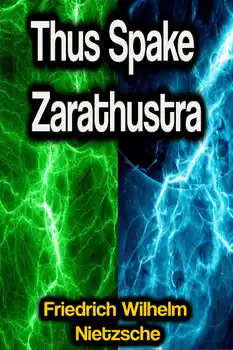Thus Spake Zarathustra Friedrich Wilhelm Nietzsche - Thus Spoke Zarathustra: A Book for All and None (German: Also sprach Zarathustra: Ein Buch für Alle und Keinen, also translated as Thus Spake Zarathustra) is a philosophical novel by German philosopher Friedrich Nietzsche, composed in four parts between 1883 and 1885 and published between 1883 and 1891. Much of the work deals with ideas such as the "eternal recurrence of the same", the parable on the "death of God", and the "prophecy" of the Übermensch, which were first introduced in The Gay Science.Thus Spoke Zarathustra was conceived while Nietzsche was writing The Gay Science; he made a small note, reading "6,000 feet beyond man and time," as evidence of this. More specifically, this note related to the concept of the eternal recurrence, which is, by Nietzsche's admission, the central idea of Zarathustra; this idea occurred to him by a "pyramidal block of stone" on the shores of Lake Silvaplana in the Upper Engadine, a high alpine region whose valley floor is at 6,000 feet (1,800 m). Nietzsche planned to write the book in three parts over several years. He wrote that the ideas for Zarathustra first came to him while walking on two roads surrounding Rapallo, according to Elisabeth Förster-Nietzsche in the introduction of Thomas Common's early translation of the book.Although Part Three was originally planned to be the end of the book, and ends with a strong climax, Nietzsche subsequently decided to write an additional three parts; ultimately, however, he composed only the fourth part, which is viewed to constitute an intermezzo.Nietzsche commented in Ecce Homo that for the completion of each part: "Ten days sufficed; in no case, neither for the first nor for the third and last, did I require more" (trans. Kaufmann). The first three parts were first published separately, and were subsequently published in a single volume in 1887. The fourth part remained private after Nietzsche wrote it in 1885; a scant forty copies were all that were printed, apart from seven others that were distributed to Nietzsche's close friends. In March 1892, the four parts were finally reprinted as a single volume. Since then, the version most commonly produced has included all four parts.The original text contains a great deal of word-play. An example of this is the use of words beginning über ("over" or "above") and unter ("down" or "below"), often paired to emphasise the contrast, which is not always possible to bring out in translation, except by coinages. An example is Untergang, literally "down-going" but used in German to mean "setting" (as of the sun), which Nietzsche pairs with its opposite Übergang (going over or across). Another example is Übermensch (overman or superman), discussed later in this article.

Antikristus: Arvostelukoe kristinopista
Friedrich Wilhelm Nietzsche
book
Learn German with Bilingual Books
Charles Dickens, Leo Tolstoy, Friedrich Wilhelm Nietzsche, Voltaire, Joseph Karl Benedikt Freiherr von Eichendorff, William Shakespeare, Charlotte Bronte, Gustave Flaubert, Wilhelm Busch, Oscar Wilde, Edgar Allan Poe, Victor Hugo, Niccolo Machiavelli, Hans Theodor Woldsen Storm, Heinrich Hoffmann
book
Human, All Too Human: A Book for Free Spirits
Friedrich Wilhelm Nietzsche
book
La Volonté de puissance
Friedrich Wilhelm Nietzsche
audiobook
The Antichrist
Friedrich Wilhelm Nietzsche
book
Beyond Good and Evil - Friedrich Wilhelm Nietzsche
Friedrich Wilhelm Nietzsche
book
Thus Spake Zarathustra : Spanish Edition
Friedrich Wilhelm Nietzsche
book
Más allá del bien y del mal
Friedrich Wilhelm Nietzsche
book
50 Masterpieces you have to read before you die Vol: 2 [newly updated] (Golden Deer Classics)
Lewis Carroll, Mark Twain, Jules Verne, Oscar Wilde, Golden Deer Classics, Arthur Conan Doyle, Louisa May Alcott, Jane Austen, J.M. Barrie, B.M. Bower, Frances Hodgson Burnett, Robert William Chambers, G.K. Chesterton, Wilkie Collins, Charles Darwin, Daniel Defoe, Margaret Deland, Charles Dickens, Fyodor Dostoyevsky, Alexandre Dumas, Francis Scott Fitzgerald, E. M. Forster, Sigmund Freud, Thomas Hardy, Hermann Hesse, James Joyce, Andrew Lang, Jack London, H.P. Lovecraft, Lucy Maud Montgomery, Friedrich Wilhelm Nietzsche, Edgar Allan Poe, Marcel Proust, William Shakespeare, Robert Louis Stevenson, William Strunk Jr., Vatsyayana, H.G. Wells, Virginia Woolf
book
El Anticristo
Friedrich Wilhelm Nietzsche
audiobookbook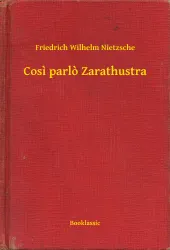
Cosi parlo Zarathustra
Friedrich Wilhelm Nietzsche
book
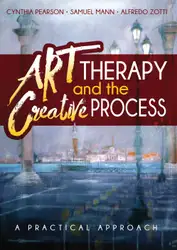
Art Therapy and the Creative Process
Cynthia Pearson, Alfredo Zotti
book
Ihminen on herkkä eläin : Omaelämäkerrallinen essee
Rafael Donner
book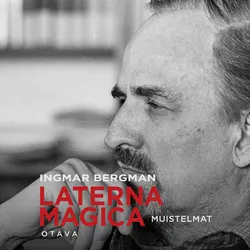
Laterna magica
Ingmar Bergman
audiobookbook
Ctrl+Alt+Kaaos : Julius Kivimäen ja muiden hakkerien jäljillä
Joe Tidy
audiobookbook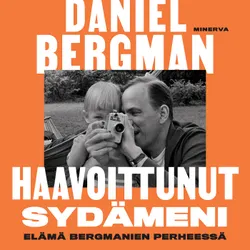
Haavoittunut sydämeni : Elämä Bergmanien perheessä
Daniel Bergman
audiobookbook
Rikkaruoho : Viimeinen kirje isälle
Otto Gabrielsson
book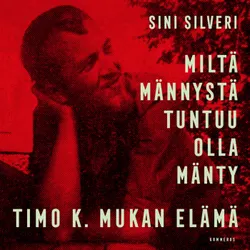
Miltä männystä tuntuu olla mänty
Sini Silveri
audiobookbook
Kaikkeuden sylissä : Neurokirurgin matka tietoisuuden ytimeen
Eben Alexander
book
Hengissä, yhä
Meri Eskola, Sanna Kiiski
audiobookbook
Sarviini puhkeaa lehti
Noora Vaarala
audiobookbook
Harri Henttinen – Sieluni värit
Miia Siistonen
audiobookbook
Hajonneen maailman käyttöohje
Ville-Juhani Sutinen
audiobookbook
